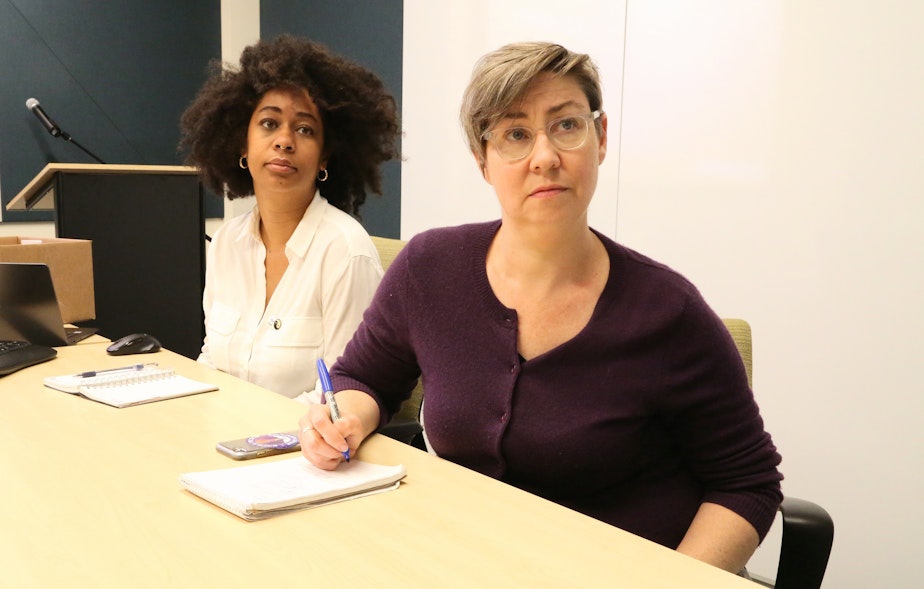Ready to go public about why you quit? Listen to this first

On our fifth bonus episode of Battle Tactics for Your Sexist Workplace, we talk to journalist Emily Schwing.
You may notice that there's no audio here. That's because our bonus episodes are available to listeners who support BTSW and our home station, KUOW, with a one-time contribution of $20.
Disclosure: In this episode, reporter Emily Schwing talks about her decision to quit her job at Northwest News Network (N3) and to go public about pay disparity among N3 reporters. N3 is made up of a handful of public radio stations in the Pacific Northwest — including KUOW. KUOW’s President and General Manager, Caryn Mathes, is a member of N3’s board.
Schwing has over 17 years of experience as a journalist. Just last year, she and her team broke an important story about how the Jesuits sent Catholic priests accused of sexual abuse to retire on Gonzaga’s campus.
But her recent writing that drew the most attention was this tweet from March 6:
"Breaking: Schwing quits the Northwest News Network. Number one reason? My male colleagues make tens of thousands of dollars more for the same work. And tbh - making this public scares the sh*t out of me. #publicradiolife"
Public records show that Schwing was paid approximately $20,000 less than her male peer reporters. Her former employer attributed that disparity to geography (Schwing was based in Spokane, Washington, where pay and cost of living are lower than Olympia, where her male colleagues are based) and the quirks of the reporting consortium (Schwing was technically an employee of Washington State University, while her former coworkers are employees of University of Washington). Other factors like experience and starting salary might also have played a role in the disparity in pay between employees. You can read more about the situation in this Seattle Times article.
Sponsored
In this bonus episode, we focus on the second half of her tweet: the part about making her story public, and the fear of speaking out.
Schwing said that one of the reasons she wrote that tweet was that, as a reporter, she felt like she had a responsibility to provide accurate information.
“The things that drove me to making this public are very simple and very much based in how I operate as a journalist. I wanted things to be clear, I wanted the truth to be out there, and I wanted zero question about what my reasoning was and why I did it,” she said. “And I also wanted people to realize that this was an issue that I had actually worked on behind the scenes for three years and it went nowhere.”
Her advice for anyone planning on quitting because of a pay gap — and before going public — is this: “The first thing that I would tell you is keep thinking about it. Like keep thinking about it until you are so tired of thinking about it that it has weighed you down, and you can’t get out of bed because it’s so exhausting to continue to think about it.”
“I really feel like this is not a decision to be made lightly,” she said.
Sponsored
Many of the tactics Emily recommends—planning in advance, figuring out implications for healthcare benefits, etc.—echo advice offered by Liz Fong-Jones in our recent episode, “Ready to quit your job? We’ve got tactics for that.” You can check it out here.



